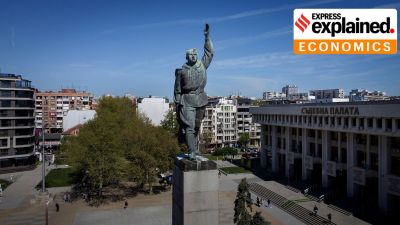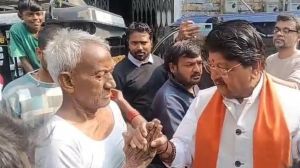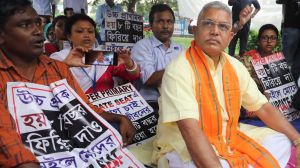Billion excuses, zero golds
The Olympic Games are here and, as a former international sportsman, I am once again asked a depressing question: what is wrong with sports ...

The Olympic Games are here and, as a former international sportsman, I am once again asked a depressing question: what is wrong with sports in India? My reply, once again, is: what is right with it? There is a declining trend in every discipline, including athletics which made me famous worldwide in the 8217;50s and 8217;60s.
After every international championship, be it the Olympics, Commonwealth Games or Asian Games, there is a lot of hue and cry nationwide about India8217;s poor performance. Suggestions pour in from every quarter on how to improve our status in sports. But the Indian Olympic Association IOA and the federations take no further interest once criticism subsides. All suggestions are simply locked away in cupboards.
Ever since I made a name for myself, I have attended a number of national and international meets in the country. I am forced to say that such competitions have become mere tamashas to please VIPs. There is little of sports and more of song and dance in such meets. Is this the way sports will be propagated in our country? I wait for an answer from the people who really wish to see India improve its standard in sports.
So what is wrong with Indian sports, and what can we do about it? The ills are many. The whole system needs to be changed, from the top to the bottom. Every entity and person in this chain, whether the IOA and its affiliated federations, or coaches, sportspersons, etc, has to be dedicated, sincere.
This is a suggestion I made after the Sydney Games in 2000: we should hand over the training of our sportspersons to the army. Two or three centres should be set up across the country to nurture young talent for the next Olympics and other international competitions. We need danda discipline for at least a decade or so.
We have trusted the SAI and NIS coaches for too long now. If they are not achieving the desired results, we should hire foreign coaches with expertise in scientific coaching. Good Indian coaches should be allowed to work independently and not be under anybody8217;s influence. All of them should be kept on a contract basis for a minimum of four years so that they have enough time to deliver results. There should be a coach for every sprint and discipline. What we need most of all is accountability.
Young talent should be spotted keeping in mind demographic profiles. In the coastal areas, swimming and running are to be exploited. Sprinters are good in the south, throwers in the north. India could be divided into four zones. Talent in athletics should be kept at six places 8212; Patiala, Bangalore, Kolkata, Bihar, Kerala and Chennai.
Talented players should be given facilities and exposure to modern technology. In China, talent is kept at one place sports schools and given training for 8-10 years along with education. Later on, when individuals give their best performance, they are absorbed in jobs in the field of sports only. With such a system, parents in India would also feel encouraged to allow their children to take up sports.
Players should be free from any kind of mental pressure. We should ensure job security for players who excel at the international level. If any individual gets a medal at the Olympics, he should get a job equivalent in rank and remuneration to those held by someone his age with, say, an MBA.
The IOA should streamline its activities. It should ensure that the national federations are made accountable for their performance. They can go to the extent of disaffiliating a sick unit which is not giving specified results. The IOA constitution needs amendment. At present, many federations exist on paper only but they are not disaffiliated because of the votes they deliver at the time of elections.
When I was an active athlete, I used to be sincere and dedicated towards my training. This spirit is missing amongst today8217;s athletes. There were no attractive jobs for us then, no sponsorships. But still, athletes in my time exhibited great devotion and discipline. For instance, I would vomit blood after training continuously for five hours. I was so eager to break the world record that, in the initial stages of my career, I used to overdo it every time. It was due to this hard work that I could achieve the Olympic record-breaking time in 400 m at the Rome Olympics in 1960. Self-motivation played a big role in my career. There was no coach, no scientific training, no dietician, no running shoes, no track suit and, yes, no drugs when I ran.
Time and again I have raised my voice against doping. Our athletes take performance-enhancing drugs during home competitions, qualify for big meets and come a cropper there. Or else, how would you describe their amazing record-breaking feats in national meets and zero performance at the international level. Also, tell me, can they do it without the knowledge of their coaches? In order to get instant results for their wards, and awards for themselves, coaches introduce athletes to drugs. Such coaches should be banned, their association/federation debarred, disaffiliated. Nepotism too has intensified over the years.
But, despite all these factors, sportspersons have achieved success only due to individual effort and hard work. Gurbachan Singh Randhawa 110 m hurdles, 1964 Tokyo Olympics, Sriram Singh 800 m, Montreal, 1976, P.T. Usha 400 m hurdles, Los Angeles, 1984, Leander Paes Atlanta, 1996 and Karnam Malleswari Sydney, 2000. I have great respect for them, they swam against the tide.
I really don8217;t know whether Anju Bobby George will be able to join this list but she is certainly our best hope to win a medal at Athens this time. I wish her all the best but would still add that she has only an outside chance to grab the honours, about 25 per cent.
In a nation of more than a billion people, it8217;s a shame that not even a single athlete has ever won an Olympic medal. There is one thing I am sure of though 8212; some time early next month top IOA officials who8217;ve been getting themselves re-elected for decades now will have a billion excuses to explain what really went wrong at Athens.
- 01
- 02
- 03
- 04
- 05































